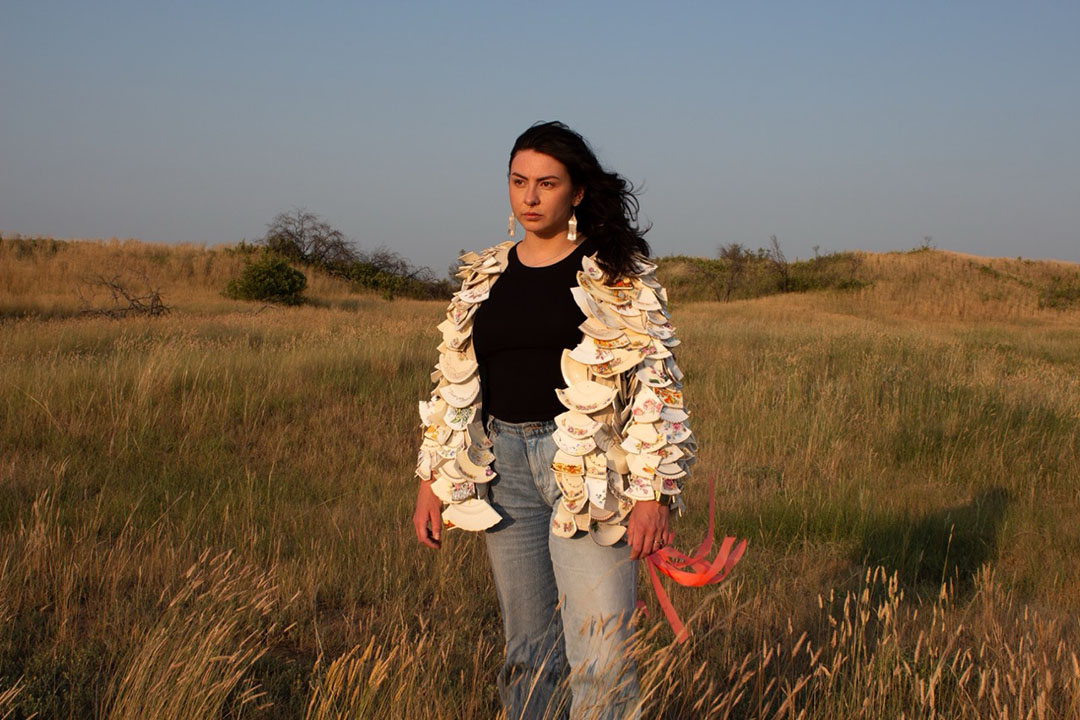
Indigenous USask graduating student uses art, degree to build community
An award-winning multimedia artist and musician will be graduating with a master’s degree at the 2024 USask Fall Convocation.
By Kristen McEwenA Master of Fine Arts (MFA) degree was a way for Aurora Wolfe (BA’22) to officially recognize what she was already doing —beading, community artwork and outreach.
“I was like, ‘Oh, why am I not also doing this in school and getting credit for it?’” she said.
Wolfe is a multimedia artist, musician and researcher from Mortlach, Sask. She is Cree, a member of Beardy’s and Okemasis’ Cree Nation, and of Scottish descent. She will be graduating with an MFA in Studio Art during the University of Saskatchewan (USask) Fall Convocation on Nov. 13 at Merlis Belsher Place.
Wolfe completed her Bachelor of Arts degree in Indigenous Studies in 2022 and received an Indigenous Student Achievement Award from USask in 2020. She also received the Tania Balicki Memorial Award in Indigenous Studies in 2022.
When she first applied for the MFA program, Wolfe wanted to focus her thesis on the intersectionality between Indigeneity and agriculture.
“I wanted to think about it on more of a systemic level,” she said. “Looking into the barriers that separate Indigenous people and agriculture, and how almost a reckoning with how big culturally agriculture is in Saskatchewan, or the community context. Why was there this huge divide?”
Wolfe grew up in a community pasture where they raised sheep in southern Saskatchewan. Wolfe lived with her grandmother, who raised her and shaped her experience with agriculture.
“I started making art, and during the first year of your (MFA) program, you experiment,” she said. “When it came time for me to focus in and reground myself in my practice, I went to my original (proposal) ... and I was like, ‘I’m going to start with my own experience’, almost like I needed to get it out of my system, you know? Before I could talk about things on a really wide scale, I wanted to know how I specifically felt about it.”
Wolfe began to dig into her own life and her family’s experiences—her Indigenous ancestry, her mother’s experience in the Sixties Scoop and being removed from her family, and then being adopted by Wolfe’s grandmother.
“There were all of these weird separations, and my experience with the land is kind of strange,” she said.
Upon reflecting on her personal and family history, Wolfe embarked on creating her MFA thesis show entitled, coyote dreams of easy prey.
The exhibition featured her award-winning beaded sculpture, my body is the river that shapes the ground before you. The sculpture is a pair of long beaded earrings on hooks. The long threads of the earrings wind and weave on the ground. Wolfe describes her work as “tracing parallels between land and body, this work speaks to the complicated processes of reconnection and return.”
Her beaded sculpture also led to Wolfe receiving the 2023 Outstanding Student Achievement in Contemporary Sculpture Award from the International Sculpture Centre in New Jersey. She was also the only Canadian recipient that year.
"It really surprised me, especially because there were applicants from all over the world,” she said. “I was really kind of blown away.”
Wolfe’s MFA thesis was also a way to think about art as research and knowledge creation.
“(I could) apply the things I learned in my Indigenous Studies (degree) and create something that was more holistic,” she said.
She thoroughly enjoyed having a studio space on campus—a challenge facing many artists in Saskatoon.
“Having those resources, and access to a shop and printmaking studio, it was really great to just experiment and learn how to do things,” she said.
“Time and space are the main reason I wanted to do my MFA because you’re never going to be able to find that kind of structure in place to support you so well,” she said. “Because the faculty offers so much guidance and they have so many connections they can draw on—and experiences.”
As she completed her Bachelor of Arts degree in Indigenous Studies in 2022, classes were resuming in person after being remote due to the pandemic. The MFA program is structured so graduate students go through the program as a cohort.
“You become really close with them (the cohort) because they’re working together, critiquing each other’s art, and sharing some of the most vulnerable parts of yourself,” she said.
Currently, Wolfe is the Indigenous initiatives co-ordinator for the College of Graduate and Postdoctoral Studies.
She is bringing together Indigenous graduate students through various methods and activities, including welcome lunches and a group chat, fondly called “Cousins.”
Wolfe is also co-ordinating an upcoming project called “Stitching Stories,” which will feature a hexagon paper quilt where each piece will represent an Indigenous graduate student.
As she was the only Indigenous person in her second year of her MFA program, Wolfe could relate to feeling lonely at times.
“Especially for students that are online or living in other places and trying to connect virtually, (community building) is really important so people aren’t feeling so isolated because grad school is so stressful.”
For Indigenous students attending university, or considering pursuing a master’s degree, Wolfe shared some advice.
“Use the resources that the university offers, go get writing help at the library if you need it,” she said.
“There are so many resources that are set out and don’t isolate yourself,” she added. “Get out there and do stuff. It’s very important to feed your soul as well as your mind.”
Together, we will work towards Truth and Reconciliation. We invite you to join by supporting Indigenous achievement at USask.
Article re-posted on .
View original article.

